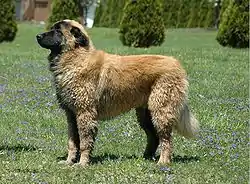cão
See also: Appendix:Variations of "cao"
Galician
References
Old Galician-Portuguese
Pronunciation
- IPA(key): /ˈkã.u/
Portuguese

cão (etymology 1)
Pronunciation
- (Brazil) IPA(key): /ˈkɐ̃w̃/ [ˈkɐ̃ʊ̯̃]
- (Portugal) IPA(key): /ˈkɐ̃w̃/
Audio (Brazil, Center-West) (file) - Rhymes: -ɐ̃w̃
- Hyphenation: cão
Etymology 1
Inherited from Old Galician-Portuguese can, from Latin canis, canem, from Proto-Italic *kō (accusative *kwanem), from Proto-Indo-European *ḱwṓ (accusative *ḱwónm̥). Compare Galician can, Spanish can, Catalan ca, French chien, Italian cane, Romanian câine and Aromanian cãne.
Usage notes
In Brazil, cão is somewhat formal, and cachorro is the most common term in neutral or informal contexts.
Etymology 2

cão (etymology 2)
Inherited from Old Galician-Portuguese cão, from Latin cānum (“gray”), from Proto-Italic *kaznos, from Proto-Indo-European *ḱas-. Cognate with Spanish cano.
Adjective
cão (feminine cã, masculine plural cãos, feminine plural cãs)
- white-haired
- Synonym: grisalho
Related terms
Etymology 3
From Persian خان. (This etymology is missing or incomplete. Please add to it, or discuss it at the Etymology scriptorium.)
Further reading
 cão on the Portuguese Wikipedia.Wikipedia pt
cão on the Portuguese Wikipedia.Wikipedia pt
This article is issued from Wiktionary. The text is licensed under Creative Commons - Attribution - Sharealike. Additional terms may apply for the media files.